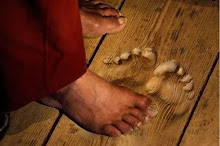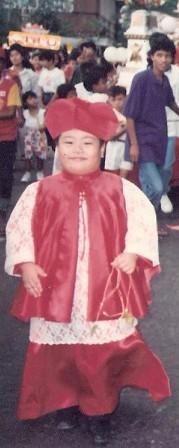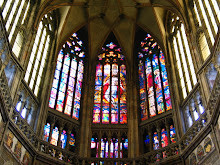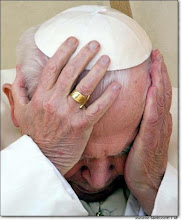26 March 2009
Live it!
"We must be convinced of the necessity of having a living, authentic, and active faith. That is all the more true today, when we face so many difficulties. It is not enough to have a vague, weak, or uncertain faith" - Bl. John XXIII
24 March 2009
22 March 2009
He does the work...
In the Bible the cross is the expression of a life that is completely being for others. It is not man who goes to God with a compensatory gift, but God who comes to man, in order to give to him. He restores disturbed right on the initiative of his own power to love, by making unjust man just again, the dead living again, through his own creative mercy.
In the New Testament the cross appears primarily as a movement from above to below. It does not stand there as the work of expiation which mankind offers to the wrathful God, but as the expression of that foolish love of God's which gives itself away to the point of humiliation in order thus to save man; it is his approach to us, not the other way about.
Benedictus
Pope Benedict XVI
In the New Testament the cross appears primarily as a movement from above to below. It does not stand there as the work of expiation which mankind offers to the wrathful God, but as the expression of that foolish love of God's which gives itself away to the point of humiliation in order thus to save man; it is his approach to us, not the other way about.
Benedictus
Pope Benedict XVI
21 March 2009
Todo o Nada
"You cannot be half a saint. You must be a whole saint or no saint at all you will remain."
St Therese of Lisiuex
St Therese of Lisiuex
10 March 2009
Hunger and Hurricanes
To be human is to be hungry. All children are hungry. They are born hungry. Most children are always hungry. Some children are starving. It is terrifying to see a starving child. It is more terrifying to be a starving child. Starvation is horrible. To be without food is hell.
To have experienced the Christ, to have encountered Jesus of Nazareth, to have run head-long into the person of God in the flesh must have been like stepping into the path of a hurricane. No one would do it intentionally. Human beings do not seek out hurricanes. Hurricanes happen. Suddenly. Often without much warning. If we can avoid "being there", we do. If we can't, we don't. Its really almost as simple as that. To experience the Christ is to run head-long into the path of a hurricane. Jesus said: Man cannot live by bread alone. He said that to hungry human beings. He said that to starving children. Yet, Jesus was criticized for eating with publicans and sinners, and going among the people eating and drinking, for being a winebibber, for eating grain on the Sabbath, for eating when he was hungry and sleeping when he was tired. He was criticized by hungry human beings. He was chastised by starving children.
On the other hand, for forty days and forty nights, Jesus was without food. He told Martha that she was too concerned with food. He said: when you are without food, wash your face. He said: you are too worried about what you shall eat and drink. He sent his disciples out without food and, on the cross, he refused a sponge filled with vinegar and hyssop.
Jesus ate and drank. And he didn't eat and drink. He was something of a paradox in regards to hunger and fulfillment. Curiously enough, what has been called the extension of the Body of Christ - the Church - eats and drinks and it doesn't eat and drink. The Church feasts and the Church fasts. The central act of the Church is a common meal. The ultimate mythical fulfillment of the Church is a heavenly banquet. The Church is something of a paradox when it comes to hunger and fulfillment.
To be human is to be hungry. Most children are always hungry. Some children are starving. Starvation is horrible. To be without food is hell.
To be the Christ, to be Jesus of Nazareth, to be the person of God incarnate must be like being the eye of a hurricane. The eye of a hurricane is its focus, its power, the apparently unmoving force that instigates the terrible headwind. The hurricane's eye is self-contained and calm. yet the experience of the hurricane itself is scattered, disassembling, chaotic, violent motion.
The action of God in history is something of a paradox. One of our hymns reflects this disturbing paradox when it says: The peace of God - it is no peace - but strife sown in the sod...
St. Peter appears to have found the peace of God in an upside-down cross. Human beings do not intentionally seek out upside-down crosses. Upside-down crosses happen. Suddenly. Often without warning. If we can avoid, "being there", we do. If we can't, we don't. It's really almost as simple as that.
God's action in history is something of a paradox as regards to hunger and fulfillment. Is is true that 5,000 people who have run headlong into the path of a hurricane and who are hungry for food and starving for peace can have their hunger sated, their very guts which have been torn apart healed? And, if it is conceivable, can it happen through the vehicles of a few fish, a little bread, and a Word? Frankly, I don't know. But I can't say that I don't care, because I do. I care terribly. After all, I'm very hungry. And I am caught in the headwind of a hurricane.
Christ have mercy upon me.
And Jesus had compassion upon the 5,000 for he saw that they had been with him the whole day and were very hungry.
Lord, have mercy upon me.
And so he asked a little boy (who else?) to share his food with them. And from the hands of a child they were fed. Children are nice. Jesus likes children.
Christ have mercy upon me.
Starvation is horrible. To be without food is hell.
Maranatha. Lord come.
Human beings do not seek out hurricanes. Hurricanes happen.
Lord now lettest thou they servent depart in peace.
And because Jesus had compassion upon them, and because the little boy had some fish, and because the eye of the hurricane enveloped them, they ate and were filled and went home. It was not very spectacular, but then, what is? It appears that Jesus simply left it at that. And then he took a deep breath of fresh air and went back to being a fugitive. Amen.
-Martin Bell
To have experienced the Christ, to have encountered Jesus of Nazareth, to have run head-long into the person of God in the flesh must have been like stepping into the path of a hurricane. No one would do it intentionally. Human beings do not seek out hurricanes. Hurricanes happen. Suddenly. Often without much warning. If we can avoid "being there", we do. If we can't, we don't. Its really almost as simple as that. To experience the Christ is to run head-long into the path of a hurricane. Jesus said: Man cannot live by bread alone. He said that to hungry human beings. He said that to starving children. Yet, Jesus was criticized for eating with publicans and sinners, and going among the people eating and drinking, for being a winebibber, for eating grain on the Sabbath, for eating when he was hungry and sleeping when he was tired. He was criticized by hungry human beings. He was chastised by starving children.
On the other hand, for forty days and forty nights, Jesus was without food. He told Martha that she was too concerned with food. He said: when you are without food, wash your face. He said: you are too worried about what you shall eat and drink. He sent his disciples out without food and, on the cross, he refused a sponge filled with vinegar and hyssop.
Jesus ate and drank. And he didn't eat and drink. He was something of a paradox in regards to hunger and fulfillment. Curiously enough, what has been called the extension of the Body of Christ - the Church - eats and drinks and it doesn't eat and drink. The Church feasts and the Church fasts. The central act of the Church is a common meal. The ultimate mythical fulfillment of the Church is a heavenly banquet. The Church is something of a paradox when it comes to hunger and fulfillment.
To be human is to be hungry. Most children are always hungry. Some children are starving. Starvation is horrible. To be without food is hell.
To be the Christ, to be Jesus of Nazareth, to be the person of God incarnate must be like being the eye of a hurricane. The eye of a hurricane is its focus, its power, the apparently unmoving force that instigates the terrible headwind. The hurricane's eye is self-contained and calm. yet the experience of the hurricane itself is scattered, disassembling, chaotic, violent motion.
The action of God in history is something of a paradox. One of our hymns reflects this disturbing paradox when it says: The peace of God - it is no peace - but strife sown in the sod...
St. Peter appears to have found the peace of God in an upside-down cross. Human beings do not intentionally seek out upside-down crosses. Upside-down crosses happen. Suddenly. Often without warning. If we can avoid, "being there", we do. If we can't, we don't. It's really almost as simple as that.
God's action in history is something of a paradox as regards to hunger and fulfillment. Is is true that 5,000 people who have run headlong into the path of a hurricane and who are hungry for food and starving for peace can have their hunger sated, their very guts which have been torn apart healed? And, if it is conceivable, can it happen through the vehicles of a few fish, a little bread, and a Word? Frankly, I don't know. But I can't say that I don't care, because I do. I care terribly. After all, I'm very hungry. And I am caught in the headwind of a hurricane.
Christ have mercy upon me.
And Jesus had compassion upon the 5,000 for he saw that they had been with him the whole day and were very hungry.
Lord, have mercy upon me.
And so he asked a little boy (who else?) to share his food with them. And from the hands of a child they were fed. Children are nice. Jesus likes children.
Christ have mercy upon me.
Starvation is horrible. To be without food is hell.
Maranatha. Lord come.
Human beings do not seek out hurricanes. Hurricanes happen.
Lord now lettest thou they servent depart in peace.
And because Jesus had compassion upon them, and because the little boy had some fish, and because the eye of the hurricane enveloped them, they ate and were filled and went home. It was not very spectacular, but then, what is? It appears that Jesus simply left it at that. And then he took a deep breath of fresh air and went back to being a fugitive. Amen.
-Martin Bell
a prophecy
the mission you refuse now, you will one day accept. the light you cannot see will be shown to you. one day you will feel God's hand on your shoulder, and you will walk wherever it leads you.
06 March 2009
Kill them all!
The latest from Rolheiser...
Our Struggle in Faith - Between Knowing It Is True and Believing it!
2009-03-01
At the heart of our faith lies the deep truth that we are unconditionally loved by God. We believe that God looks down on our lives and says: You are my beloved child, in you I take delight! We do not doubt that truth of that, we just find it impossible to believe.
Some years ago, at a workshop, a woman came up to me during the break and articulated this in these words: "God loves me unconditionally. I know that's true, but I how can I make myself believe it? I simply can't!" She could have been speaking for half of the human race. We know we are loved by God, we can say the words, but how do we make ourselves believe that?
Why? Why is that so difficult to believe?
For many reasons, though mostly because (unless we are extraordinarily blessed) we rarely, if ever, experience unconditional love. Mostly we experience love with conditions, even from those closest to us: Our parents love us better when we do not mess up. Our teachers love us better when we behave and perform well. Our churches love us better when we do not sin. Friends love us better when are successful and not needy. The world loves us better when we are attractive. Our spouses love us better when we do not disappoint them. Mostly, in this world, we have to measure up in some way to be loved.
Moreover many of us too have been wounded by supposed expressions of love that were not love at all but were instead expressions of self-serving manipulation, exploitation, or even positive abuse. Beyond even this, all of us have been cursed and shamed in our enthusiasm by the countless times someone, either through words or through a hateful or judgmental glace, in effect said to us: Who do you think you are? We wither under that and become the walking wounded, unable to believe that we are loved and loveable. So, even when we know that God loves us, how can we make ourselves believe it?
At one level, we do believe it. Deep down, below our wounded parts, the child of God that still inhabits the recesses of our soul knows that it is made in God's image and likeness and is special, beautiful, and loveable. That is why we so easily become angry and enraged whenever someone violates our dignity or puts us down.
But how do we make ourselves believe that we are unconditionally loved in a way that would make us less insecure in our attitude and our actions? How do we live in a surer confidence that we are unconditionally loved so as to let that radiate in the way we treat others and ourselves?
There are no easy answers. For a wounded soul, like for a wounded body, there are no magic wands for quick easy healings. Biblically, however, there is an image that, while confusing on the surface, addresses this: When God gives Joshua instructions on how to move into the Promised Land he tells him that, once there, he must "kill" everything there, all the men, women, children, and even the animals.
Taken literally, this text is horrible and speaks about everything that God is not. But this is not a literal text but an archetypal one. It is an image, a metaphor. I suspect that someone in an Alcoholics Anonymous program will more easily get its message: Killing all the inhabitants of Canaan means precisely giving away all the bottles in your liquor cabinet - the scotch, the bourbon, the wine, the cognac, the gin, the beer, the vodka, and everything else that's there. You can't take the Promised Land and still keep a few "Canaanites" on the side or you will soon lose the Promised Land.
That image also tells us what we must do to enter our true self-image, the deep truth that we are unconditionally loved by God. In great mythical literature we see that, usually, before the great wedding where the young prince and the young princess are to be married so as to live happily ever after, there first has to be an execution: the wicked older brothers and the wicked step-sisters have to be killed off. Why? Because they would eventually come and spoil the wedding.
Who are those wicked older brothers and wicked step-sisters? They are not different people from the young prince or princess getting married. They are their older incarnations. They are also inside of us. They are the inner voices from our past that can, at any given moment, ruin our wedding or our self-image by dragging in our past humiliations and saying: "Who do you think you are? Do you really think that you can marry a prince or princess? Do you really think that you're loveable? We know you, we know your past, so don't delude yourself! "
To actually believe that we are unconditionally loved, we first have to kill a few "Canaanites".
Our Struggle in Faith - Between Knowing It Is True and Believing it!
2009-03-01
At the heart of our faith lies the deep truth that we are unconditionally loved by God. We believe that God looks down on our lives and says: You are my beloved child, in you I take delight! We do not doubt that truth of that, we just find it impossible to believe.
Some years ago, at a workshop, a woman came up to me during the break and articulated this in these words: "God loves me unconditionally. I know that's true, but I how can I make myself believe it? I simply can't!" She could have been speaking for half of the human race. We know we are loved by God, we can say the words, but how do we make ourselves believe that?
Why? Why is that so difficult to believe?
For many reasons, though mostly because (unless we are extraordinarily blessed) we rarely, if ever, experience unconditional love. Mostly we experience love with conditions, even from those closest to us: Our parents love us better when we do not mess up. Our teachers love us better when we behave and perform well. Our churches love us better when we do not sin. Friends love us better when are successful and not needy. The world loves us better when we are attractive. Our spouses love us better when we do not disappoint them. Mostly, in this world, we have to measure up in some way to be loved.
Moreover many of us too have been wounded by supposed expressions of love that were not love at all but were instead expressions of self-serving manipulation, exploitation, or even positive abuse. Beyond even this, all of us have been cursed and shamed in our enthusiasm by the countless times someone, either through words or through a hateful or judgmental glace, in effect said to us: Who do you think you are? We wither under that and become the walking wounded, unable to believe that we are loved and loveable. So, even when we know that God loves us, how can we make ourselves believe it?
At one level, we do believe it. Deep down, below our wounded parts, the child of God that still inhabits the recesses of our soul knows that it is made in God's image and likeness and is special, beautiful, and loveable. That is why we so easily become angry and enraged whenever someone violates our dignity or puts us down.
But how do we make ourselves believe that we are unconditionally loved in a way that would make us less insecure in our attitude and our actions? How do we live in a surer confidence that we are unconditionally loved so as to let that radiate in the way we treat others and ourselves?
There are no easy answers. For a wounded soul, like for a wounded body, there are no magic wands for quick easy healings. Biblically, however, there is an image that, while confusing on the surface, addresses this: When God gives Joshua instructions on how to move into the Promised Land he tells him that, once there, he must "kill" everything there, all the men, women, children, and even the animals.
Taken literally, this text is horrible and speaks about everything that God is not. But this is not a literal text but an archetypal one. It is an image, a metaphor. I suspect that someone in an Alcoholics Anonymous program will more easily get its message: Killing all the inhabitants of Canaan means precisely giving away all the bottles in your liquor cabinet - the scotch, the bourbon, the wine, the cognac, the gin, the beer, the vodka, and everything else that's there. You can't take the Promised Land and still keep a few "Canaanites" on the side or you will soon lose the Promised Land.
That image also tells us what we must do to enter our true self-image, the deep truth that we are unconditionally loved by God. In great mythical literature we see that, usually, before the great wedding where the young prince and the young princess are to be married so as to live happily ever after, there first has to be an execution: the wicked older brothers and the wicked step-sisters have to be killed off. Why? Because they would eventually come and spoil the wedding.
Who are those wicked older brothers and wicked step-sisters? They are not different people from the young prince or princess getting married. They are their older incarnations. They are also inside of us. They are the inner voices from our past that can, at any given moment, ruin our wedding or our self-image by dragging in our past humiliations and saying: "Who do you think you are? Do you really think that you can marry a prince or princess? Do you really think that you're loveable? We know you, we know your past, so don't delude yourself! "
To actually believe that we are unconditionally loved, we first have to kill a few "Canaanites".
02 March 2009
A simple prayer
Lord, take my tired body, my confused mind, and my restless soul into Your arms and give me rest, quiet simple rest, where I can be alone with You and You can be my all.
01 March 2009
and so we wait
The entire life of a good Christian is in fact an exercise of holy desire. You do not yet see what you long for, but the very act of desiring prepares you, so that when he comes you may see and be utterly satisfied. - St. Augustine
for good.
"The ways of the Lord are not comfortable, but we are not created for comfort, but for great things, for the sake of the good." -Benedict XVI, April 25, 2005
Subscribe to:
Posts (Atom)












